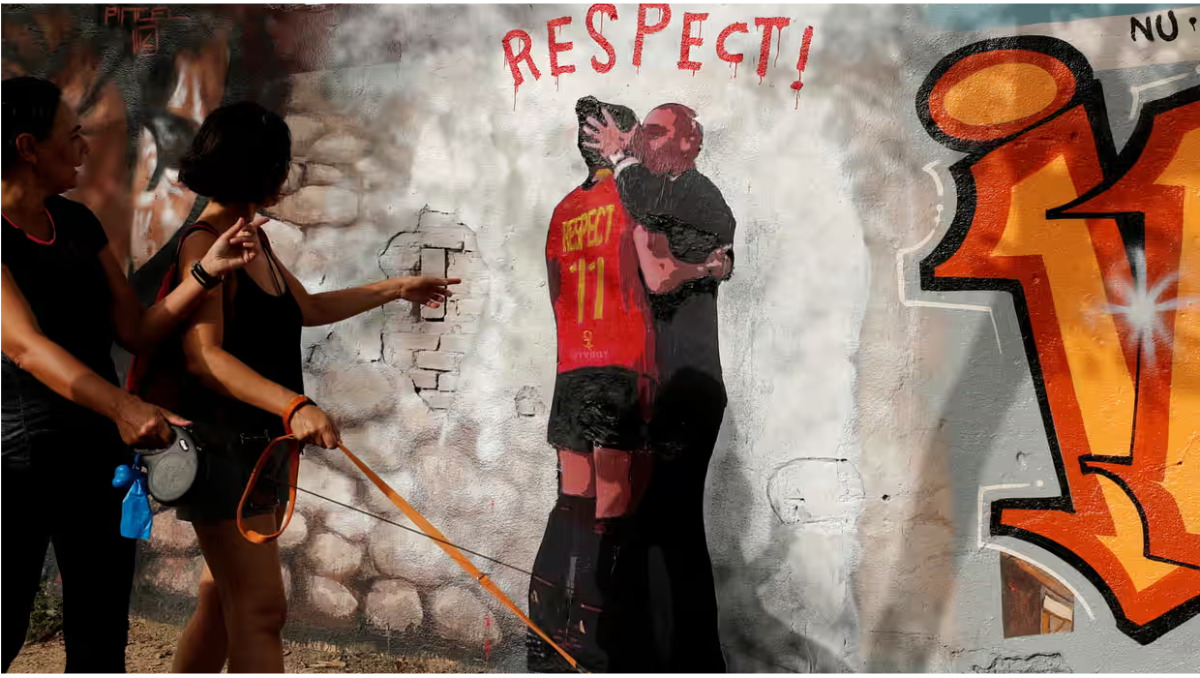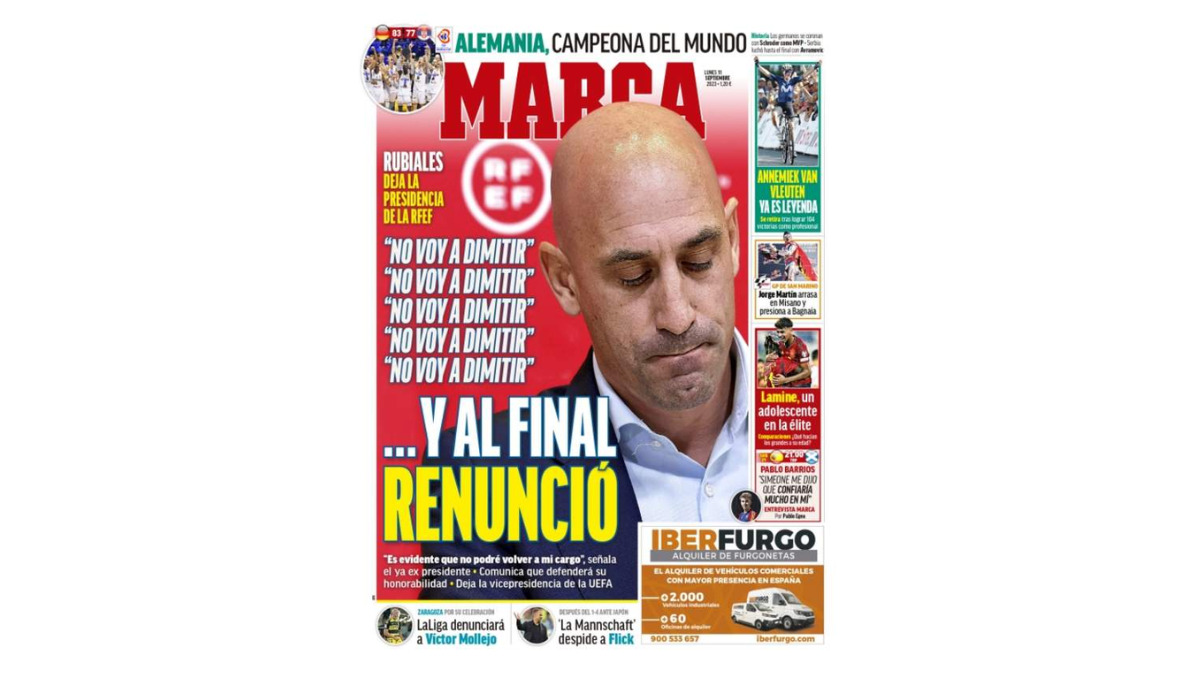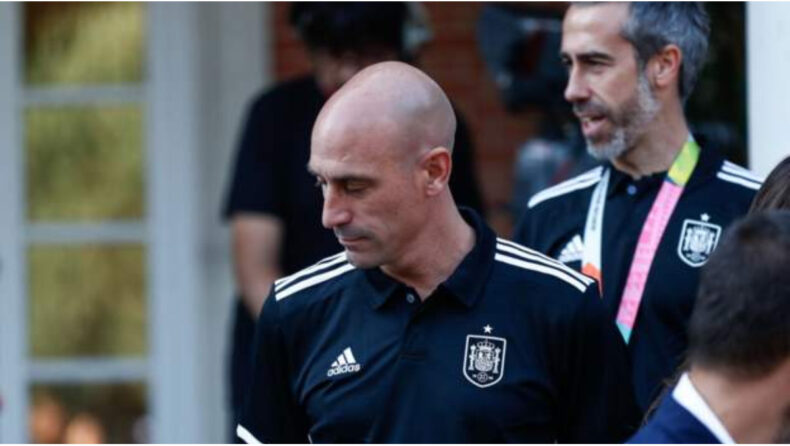Luis Rubiales has stepped down as the president of Spain’s football federation after mounting pressure following the incident at the Women’s World Cup final.
Table of Contents
“I can’t continue my work”
The disgraced leader of the Royal Spanish Football Federation (RFEF) drew the public’s ire when he grabbed Spanish midfielder, Jenni Hermoso, and kissed her during the medal presentation ceremony of the FIFA Women’s World Cup final in Sydney on 20th August.
While Rubiales’ immediate remarks appeared to downplay the situation, lambasting those critical of his behaviour as “idiots and stupid people”, social media and Spanish politicians raised a furore over Rubiales’ “abusive” actions. The incident soon grabbed headlines all over the world with various personalities weighing in on Spain’s systemic sexism, eventually resulting in FIFA suspending Rubiales for 90 days and Hermoso filing a criminal complaint of sexual assault.

During a broadcast of “Piers Morgan Uncensored” on Sunday night, the eponymous TV presenter released a clip of an upcoming interview with Rubiales where he announced his intention to hand over his resignation after weeks of surmounting pressure has left him unable to “continue his work”. He attributed his family and friends as factors behind his decision, who persisted that this wasn’t just about him, and how he needed to focus on his dignity and avoid harming “people you love and the sport you love”.
Rubiales also commented on how his “attitude” can affect “third parties”, perhaps implying that his resignation could be crucial for Spain’s chances of jointly hosting the 2030 men’s World Cup with Portugal and Morocco.
Official statement to the Spain’s football federation
Shortly after he released a statement of his resignation from the post of president of RFEF, also relinquishing his vice-presidency of UEFA. However, the 46-year-old former player still expressed his disapproval over the charges lobbed at him, branding FIFA’s suspension as made in haste, while accepting that waiting and holding on will amount to nothing positive and add further instability to the Spanish federation and Spanish football in general.
Rubiales took further aim at his “excessive persecution” in the statement, claiming that he had “faith in the truth” and would do anything to clear his name. He decried the many “falsehoods” that have caused “suffering” to his loved ones, while holding a belief that the truth would ultimately prevail “in the streets”.
Reactions from Rubiales’ relatives have been varied, with his mother Ángeles Béjar responding to the initial outcry by locking herself in a church in Motril, southern Spain and going on a hunger strike for days to protest against the charges bearing down on her son. In stark contrast, his uncle Juan Rubiales, former chief of staff to his nephew from 2018 to 2020, called him a man “obsessed with power, luxury, money and even women”, believing that he needed a “social re-education”.
Nearly 20 days after the World Cup, it’s over
Spain, and later the world have been swept up with intense discussions, widespread uproar over Rubiales’ behaviour and calls to action made by various parties, ranging from demanding his resignation to a much wider scrutiny of the sexist hurdles that still persist in women’s football. Rubiales was initially defiant in his defence, before providing an apology on video which critics have panned as half-hearted.

Five days after the incident, Hermoso released a statement of her own, describing her state of vulnerability and feeling like a victim of aggression. The kiss was an “impulsive” and “sexist” act which transgressed boundaries and lacked consent, she said, a claim that has met persistent opposition from Rubiales.
Before getting temporarily suspended by FIFA and ordered to maintain distance from Hermoso and those close to her, Rubiales had to confront criticism on the homefront, with media and prominent politicians, including the Spanish prime minister demanding his resignation.
On the day Hermoso released her statement, Rubiales summoned RFEF officials to an emergency FA meeting where he defiantly refused to step down five times, called out “fake feminism” and was met with raucous applause, with Jorge Vilda, the now-sacked head coach from the women’s national team, present among those applauding.
This only served to intensify discourse and worldwide debate around sexism and abuses of power, with the Spanish government signalling their intentions to open legal proceedings against Rubiales and wanting the moment to become Spanish football’s #MeToo, according to the secretary of sport. Heavy support came for Hermoso when 81 Spanish players, including the 23 World Cup winners, announced their unwillingness to play for the country anymore until Rubiales handed in his resignation.

Vilda, who had the support of Rubiales during the ‘Las 15′ controversy of last year, also voiced his apparent disapproval over Rubiales’ actions, but was ultimately removed as head coach on 5th September. Support for Hermoso snowballed internationally as the Spanish government’s and FIFA’s legal procedure underwent.
On 31st August, Sarina Wiegman, head coach for England’s national women’s team, dedicated her UEFA Women’s Coach of the Year award to Spain while describing the situation as “painful”, while actress Natalie Portman also commended the “resilience” of those united against Rubiales. A few days later, the men’s contingent also condoned Rubiales’ actions, with Andres Iniesta, Barcelona men’s coach Xavi Hernandez and the current men’s national team among them.
The pressure has almost reached boiling point for Rubiales after Hermoso filed a formal criminal complaint on Wednesday, with the prosecutor’s office promising a speedy processing of her testimony. Spain had recently passed a sexual consent law, which could mean that Rubiales could be handed a fine or a prison sentence of up to four years. The case has now been submitted to Spain’s high court, with Australian police announcing their intent to assist with proceedings, given the incident happened in their jurisdiction.













